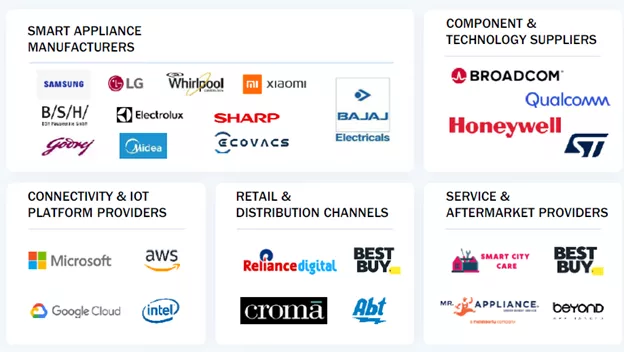According to the new market research report "Wi-Fi Chipset Market with COVID-19 Impact By IEEE Standard (802.11be, 802.11ax, 802.11ac), End-use application (Consumer, Smarthome, AR/VR, Networking Devices), Band, MIMO configuration, Vertical and Geography - Forecast 2026", published by MarketsandMarkets™, the Wi-Fi Chipset Market was valued at USD 19.7 billion in 2020 and is estimated to reach USD 25.2 billion by 2026; it is anticipated to grow at a CAGR of 4.2% during the forecast period (2021–2026)
Ask for PDF
Brochure:
https://www.marketsandmarkets.com/pdfdownloadNew.asp?id=42186393
The major factors
driving the growth of the Wi-Fi chipset market are Growing number of
public Wi-Fi hotspots, adoption of Internet of Things (IoT), growth of Wi-Fi in
enterprise and business, rising need for faster data transfer and significant
increase in the internet penetration rate. However, several factors, such as
the decline in the shipment of tablets and PCs over the last few years and long
standardization and certification time, are hindering the growth of the Wi-Fi
chipset market. Moreover, increase in coexistence issues with LTE in LTE-U due
to the use of 5 GHz band is a major challenge for Wi-Fi chipset manufacturers.
MU-MIMO
configuration is projected to witness the highest CAGR for the forecast period
MU-MIMO are expected
to hold a major share during the forecast period. The growing penetration of
MU-MIMO Wi-Fi chipsets in enterprise and consumer access point equipment is
expected to be the major driver for its growth during the initial years of
commercialization. The adoption of these chipsets in smartphones, 4K TVs, and gaming consoles is expected to
accelerate the growth of the MU-MIMO Wi-Fi segment during the latter half of
the forecast period.
802.11ax to
account for largest share of Wi-Fi chipset market during forecast
period
802.11ax is expected
to witness rapid growth in the overall Wi-Fi chipset market. This standard is
expected to offer the highest spectral efficiency among all other existing IEEE
802.11 standards and is predicted to have a top speed of around 10 Gbps (as
tested by Huawei Technologies Co. Ltd (China)).
However, to meet the emerging demands for faster speed, a new amendment
standard—IEEE 802.11be – Extremely High Throughput (EHT), also known as Wi-Fi
7—is anticipated to be released in March 2021. This new additional 6 GHz band with new features,
including speeds up to 320-MHz bandwidth, will help achieve the target of EHT—a
maximum throughput of at least 30 Gbps. It will find applications in
high-throughput and low-latency services, such as 4K/8K video streaming, AR/VR applications, and online
gaming.
Browse in-depth
TOC on "Wi-Fi Chipset Market"
147
– Tables
62 – Figures
235 – Pages
Inquiry before
Buying:
https://www.marketsandmarkets.com/Enquiry_Before_BuyingNew.asp?id=42186393
Tri band will have
highest growth in coming years
The tri band segment
is expected to account for a 24% share of the overall Wi-Fi chipset market by
2026. The high growth of the tri-band Wi-Fi chipset segment is attributed to
the use of 802.11ac in smartphones and Wi-Fi access point equipment. The
upcoming 802.11ax or Wi-Fi 6 is expected to provide 160 MHz channel widths to
accommodate data-hungry applications over the 6 GHz band; it could lead to the
adoption of Wi-Fi 6 and next-generation security of WPA3
Consumer electronics
vertical is expected to hold the largest share in 2026
With the emergence
of several smart appliances that can connect to the internet and smartphones,
the IoT technology market for the consumer electronics segment is expected to
witness healthy growth, and so is the Wi-Fi chipset market. Therefore, it tends
to hold the major share of the Wi-Fi chipset market during the forecast period.
Similarly, wide coverage range, fewer access points, minimized costs, and
simplified network deployment are the factors fueling the demand for Wi-Fi 6 in
enterprises, which was the second-largest market for Wi-Fi chipsets in 2020.
APAC is attributed
to grow at the highest CAGR in the Wi-Fi chipset market during ther forecast
period (2021-2026)
APAC accounted for
the largest share of the global Wi-Fi chipset market and is expected to
become the largest market for Wi-Fi chipsets by 2026, accounting for an
estimated 50% share of the market, in terms of volume There are several
consumer electronics product manufacturers operating in China, South Korea,
and Japan, such as Samsung Electronics Co.
Ltd. (South Korea), Huawei Technologies Co. Ltd.
(China), ZTE Corporation (China), and Sony Corporation (Japan).
The large pool of consumer electronics manufacturers and low-cost manufacturing
of Wi-Fi chipsets in China have led to
the largest share of Asia Pacific in
the Wi-Fi chipset market.

No comments:
Post a Comment